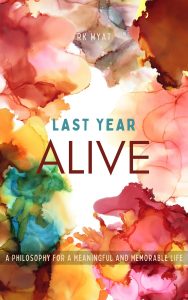I was taking an evening stroll last night with my partner when the topic of the relationship between consciousness, time, and death came up. According to his theory (which he came up with on the spot), the definition of death is that time passes infinitely fast because there is no consciousness to observe it. The tangible passage of time requires an observer, so if you're dead or asleep without dreaming or a baby, you have no (active) consciousness, and thus time passes by infinitely fast.
On the other hand, if you had infinite consciousness, time would stop passing altogether, like with the heptapods in Denis Villeneuve's movie Arrival.
Hence, this graph:

When you're a baby, you don't observe anything consciously, so time passes fast. When you reach your youth / teenage years (the global minimum of the graph), time goes the slowest: summer and Christmas holidays are always a lifetime away, the class feels like it's never going to end, and so on. This would also be the high point of your consciousness. (I definitely feel intellectually stupider now than when I was 17.)
After that, time's passage rate increases until you die - at which point, time goes infinitely fast again, because you have no consciousness to observe it.
Philosophical theories with no practical applications are so much fun, don't you think?
RK

